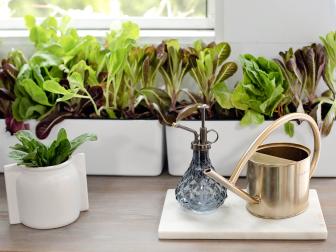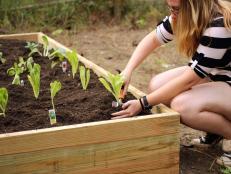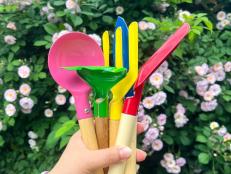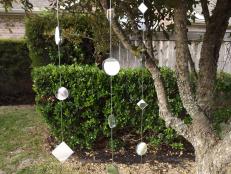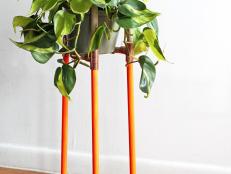What is Hydroponic Gardening and How to Make a Hydroponic System
Learn what a hydroponic system is and how to create this inexpensive system so you can easily grow flowers and vegetables year-round.

Hydroponic gardening is a great way for those with limited space to grow fruits, vegetables, herbs and even ornamental plants. While it sounds intense and complicated, hydroponic gardening is a simple concept. And, with so many different types of hydroponic gardens, each with different pros and cons as well as a wide range of price points, there are options for gardeners of all levels of experience and growing budgets.
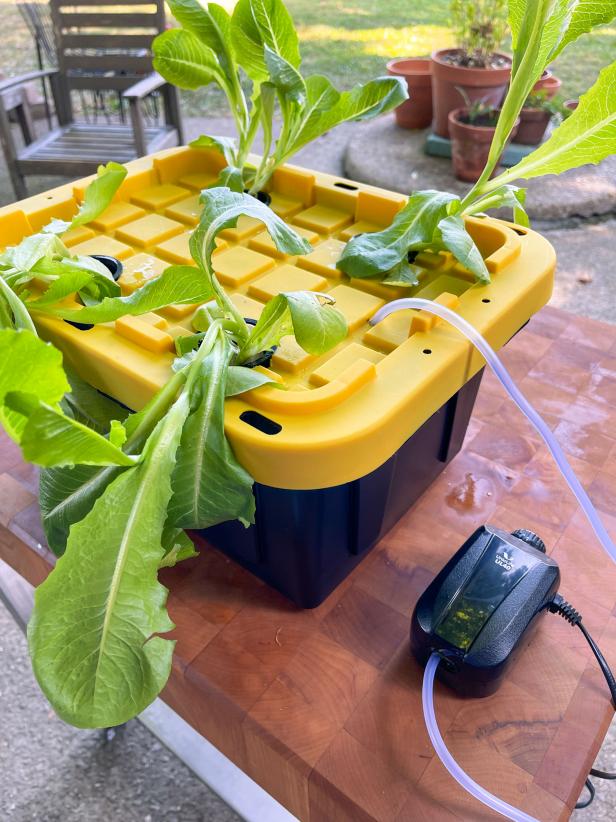
Kamron Sanders
It doesn't take much to build an effective DIY hydroponic garden, which nourishes plants with nutrient-rich water rather than soil.
In This Article
- What Is Hydroponic Gardening?
- Hydroponics vs. Aquaponics
- How Long Does It Take to Grow Hydroponic Vegetables?
- The Benefits of Hydroponics
- The Downsides of Hydroponics
- Types of Hydroponic Growing Systems
- The Best Plants for Hydroponics
- How to Build a Deep Water Culture Hydroponic System
- Tips for Successful Hydroponic Gardening
What Is Hydroponic Gardening?
Growing hydroponically may seem like a new and complicated invention, but it’s a rather simple, time-tested practice that recent technologies have only advanced and made more widespread.
In essence, hydroponic gardening is the practice of growing plants in water instead of soil. There are many methods, some low-tech and some high-tech, but the essentials are the same: Plant roots develop in water, nutrients are added to the water to feed plants via the roots, and a light source (natural or artificial light) stimulates growth through photosynthesis in the plant leaves. The lack of soil keeps maintenance down to a minimum, while the constant access to nutrients in the water keeps the plants fed and thriving with little effort.
Hydroponics vs. Aquaponics
Sometimes hydroponics is confused with aquaponics. While the terms sound similar, there is a difference. Aquaponics is like hydroponics but with fish. Instead of adding nutrients to the water as you would with a hydroponics system, the fish waste feeds the plants.
How Long Does It Take to Grow Hydroponic Vegetables?
The amount of time it will take to grow vegetables hydroponically is determined by many factors, including the vegetable being grown, the exact variety of that vegetable growing, and the growing conditions. Overall, though, vegetables grown using hydroponic systems under optimum conditions should produce food more quickly than vegetables grown under the best conditions outdoors.

This pantry includes a hydroponic garden with smart grow lighting that makes it easy to grow produce at home year-round.
The Benefits of Hydroponics
- Year-Round Growing. You can grow, harvest and eat vegetables beyond the normal growing season; for example, you can grow tomatoes in winter.
- You Can Create Ideal Conditions. You don't have to worry about Mother Nature providing the right amount of light, nutrients or temperature.
- Good for Small Spaces. Hydroponics are perfect for smaller homes or apartments. they don't take up a lot of space and can be grown vertically.
- Urban-Friendly. Hydroponics are a good option for those without access to an outdoor space, including in high-density urban areas.
- A Shorter Growing Period. For some plants, hydroponics produce faster with increased total yield.
For any serious gardener looking to get a lot of bang for their buck, the idea that hydroponic gardening can shorten growing times and increase overall yields is a major plus. For example, a head of lettuce can be harvested in as little as 35 days, which is half or even less than half (depending on the variety) of the normal time it would take to grow a head of lettuce outdoors. There won’t be as much of a discrepancy between the time it takes to grow fruiting vegetables, such as tomatoes, but it will likely be faster growing them hydroponically than growing them outdoors in a regular garden, provided they’re being grown under ideal conditions.
The Downsides of Hydroponics
- The Initial Cost of Setup. It will vary based on the method and scope, but it can be expensive. That's why we suggest our inexpensive DIY setup below.
- Missing Out on the Outdoors. Some people enjoy digging in the dirt and hydroponics doesn't provide physical and psychological benefits of gardening outdoors.
- Possible Diminishment of Flavor. Some gardeners have reported that vegetables grown hydroponically don’t have the same flavor profiles as those grown outside under the sun.
- The Possibility of System Failure. A power outage or broken equipment can ruin your crop; be sure not to rely too much on systems and be engaged yourself as the gardener, too.
3 Tabletop Hydroponic Kits
No garden? No problem. Try growing your own food right on your kitchen countertop with systems that require little space, time or maintenance.
Types of Hydroponic Growing Systems
Here are the most common varieties of hydroponic gardens:
- Deep Water Culture Hydroponic System. This hydroponic method consists of suspending the roots of the plants into a container of water that is nutrient-rich and actively oxygenated by a pump with an airstone (an aquarium bubbler).
- Wick Hydroponic System. A wick hydroponic system utilizes a wick, typically made of cotton or nylon, to draw the nutrient-rich water to the plants, which are housed in absorbent materials like vermiculite and perlite.
- Drip Hydroponic System. A drip system is a hydroponic setup that pumps the nutrient-rich, oxygenated water through a series of tubes, then drips it on top of the plants. The solution flows through the roots and drains back into the reservoir below.
- Ebb-and-Flow Hydroponic System. An ebb-and-flow hydroponic system is a flood-and-drain hydroponic method that utilizes a separate reservoir and grow tray. A pump moves the nutrient solution to the grow tray, while an overflow drain allows the solution to return to the reservoir.
- Nutrient Film Technique (NFT) Hydroponic System. NFT hydroponics is similar to an ebb-and-flow system, as it moves the solution to the grow tray. However, unlike an ebb-and-flow system that floods the grow tray, then totally drains it, NFT systems have a constant flow of a thin layer, or film, of nutrient solution. This means the roots are in constant contact with the water.
- Aeroponic Hydroponic System. In an aeroponic system, the roots of the plants aren't ever suspended in water. Instead, the nutrient solution is misted on the plants. Because the plants are suspended in air rather than water, the nutrient solution doesn't have to be oxygenated, as the roots are simply oxygenated from exposure to the open air.
So, how do you decide which type of hydroponic system is best for you? Andrea Rzad, owner of Innovative Garden and Hydroponic Supply, suggests beginners who are looking to build a homemade hydroponic system start with a deep water culture system, as it's DIY-friendly and has a gentle learning curve. Plus, a deep water culture hydroponic system allows you to grow a wide array of plants, large or small. We've outlined how to build this system in the steps below.
The Best Plants for Hydroponics
Some plants perform better in a hydroponic garden system than others. Andrea recommends quick-turn crops for beginners. "Quick-turn crops, which are harvested in four to six weeks, are the best for beginners. You can quickly see results and gain confidence before trying longer maturing and more nutrient-demanding crops," she says. "Lettuce is the easiest because it does not take long to mature and also does not require a complex feeding schedule."
While you can grow many plants in a hydroponic system, here are some common plants that thrive:
- Lettuce and other greens
- Basil and other herbs
- Tomatoes
- Peppers
- Strawberries
How to Build a Deep Water Culture Hydroponic System
Follow the simple steps below to build your own deep water culture hydroponic system with basic tools, net cups (small pots with slotted holes), a pump with airstone and an opaque 5-gallon container.
Tools + Materials
- 5-gallon opaque container with lid
- pump with airstone
- net cups
- hydroponic nutrients
- pencil
- drill with various drill bits
- hole saw bit
- scrap board
- utility knife
- sanding block
- 'empty' water (distilled, reverse osmosis or harvested rain water)
1. Arrange Net Cups
Space the net cups according to the mature size of the plants you intend to grow. Mark the position on the lid using a pencil.
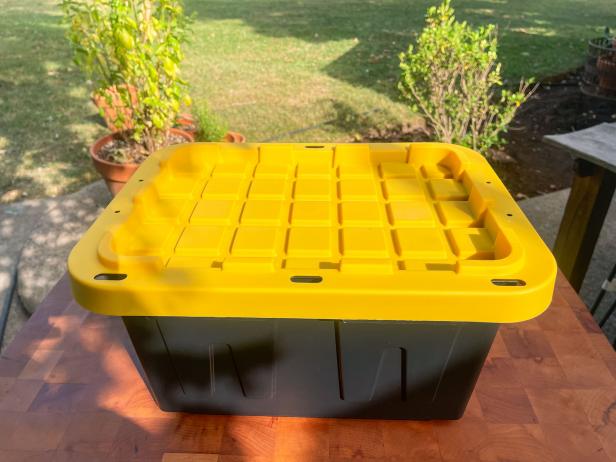
Kamron Sanders
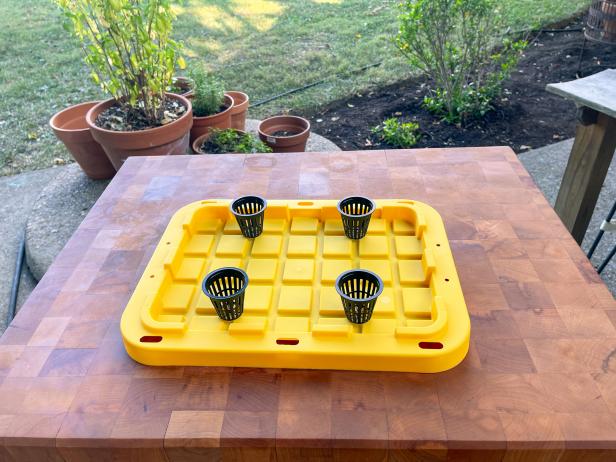
Kamron Sanders
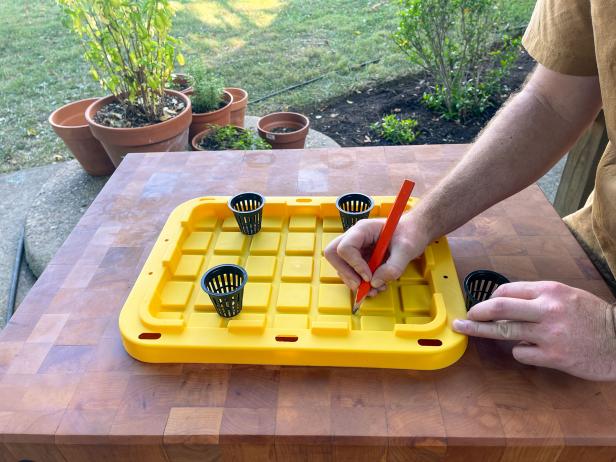
Kamron Sanders
2. Drill Holes in Lid
Slide a scrap piece of wood beneath the lid and use a drill fitted with a hole saw bit to carefully drill out the holes for the net cups.
Pro Safety Tip: When drilling plastic with a hole saw bit, the slower the bit speed the better. Drilling too fast can cause the bit to snag and fly out of control, which can cause serious injury to the user.
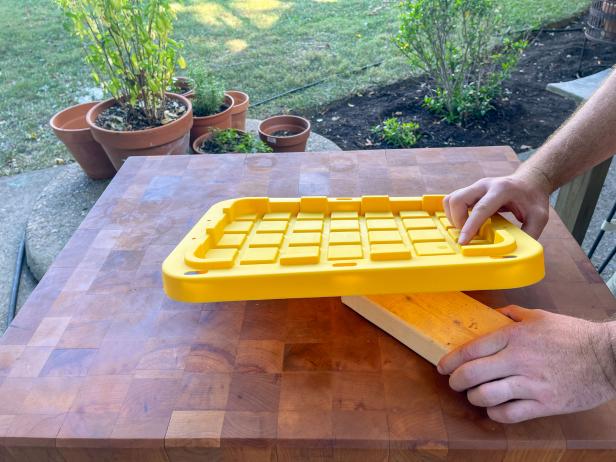
Kamron Sanders

Kamron Sanders
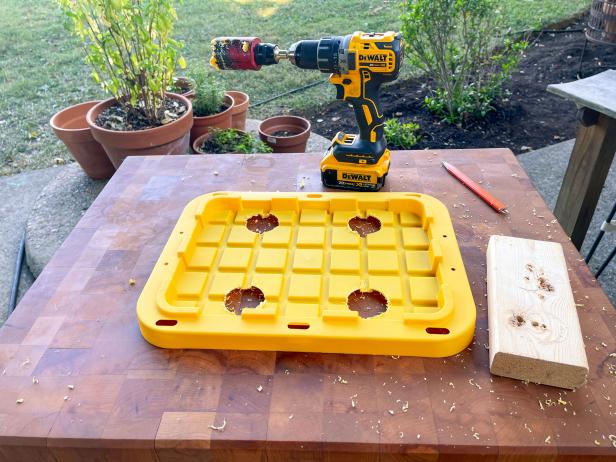
Kamron Sanders
3. Clean Up the Holes
Use a utility knife to carefully cut away any stray plastic pieces, then sand away the remainder.

Kamron Sanders

Kamron Sanders
4. Install Air Pump
Drill a hole in the top of the lid with a bit that matches the size of your air pump’s hose. Slide the hose through the hole and attach the airstone on the other side. Attach the other side of the air hose to the pump, then adjust the slack until the stone sits on the bottom of the container.
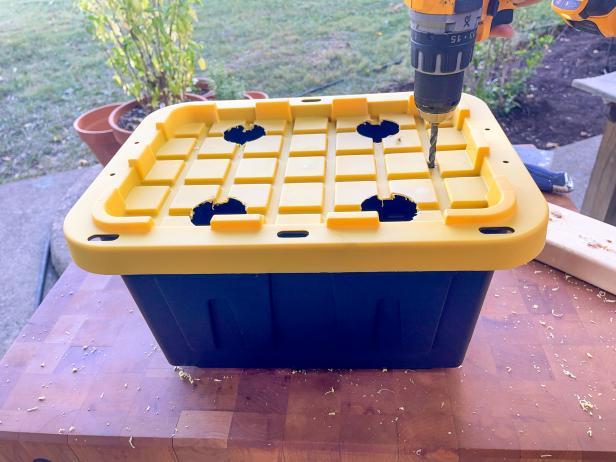
Kamron Sanders
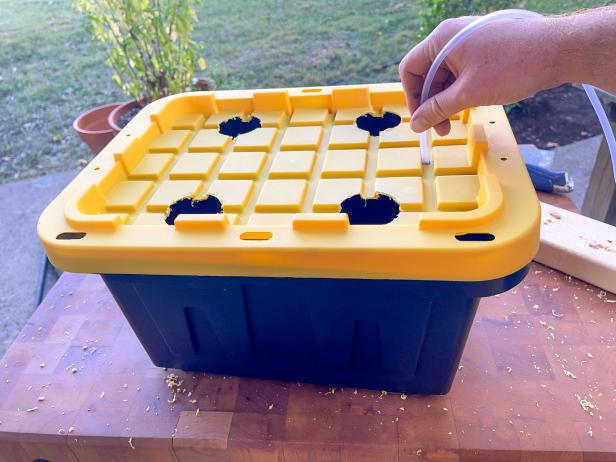
Kamron Sanders
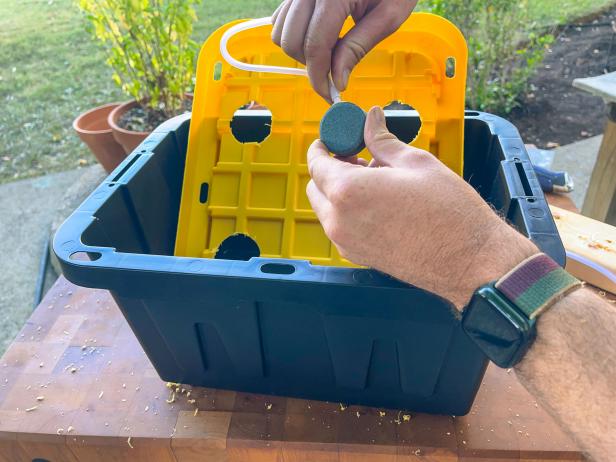
Kamron Sanders

Kamron Sanders

Kamron Sanders
5. Fill Container With Nutrient-Rich Water
Fill the container with water and add the nutrients to the water following the manufacturer’s instructions on your choice of nutrients to determine the proper amount and percentage. Turn the pump on to begin oxygenating the water.
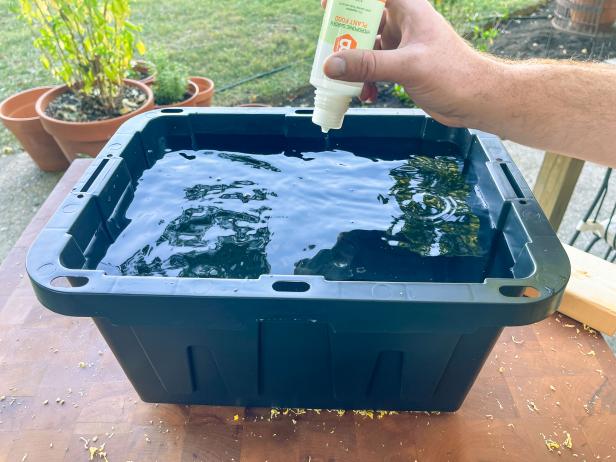
Kamron Sanders

Kamron Sanders
6. Add Plants
Place your plants in the net cups and slide them into the holes cut in the lid.

Kamron Sanders
Tips for Successful Hydroponic Gardening
As you progress on your hydroponic gardening journey, you’ll learn plenty of tricks for getting the most out of your hydroponic growing system. Here are a few tips and tricks for successful hydroponic gardening:
- Maintain the Proper pH. The water's pH is essential to maintaining your plant's health in a hydroponic system. Andrea says, "It should be kept between 5.5 and 6.5 for plants to have access to the nutrients they need." Check the pH regularly and change up your nutrient percentages to fall within the recommended window.
- Use Empty Water. "Hydroponic nutrients are designed to be used in empty water — meaning water containing very little other minerals close to 0ppm (parts per million)," says Andrea. "We recommend using distilled, reverse osmosis, or my favorite, captured rainwater because it's free."
- Regularly Change the Nutrient Solution. Andrea advocates changing the nutrient solution out on a weekly or bi-weekly basis. When doing so, drain the water and clean the reservoir rather than just adding more nutrients to the existing solution.
- Give Your Plants Plenty of Light. Just like in a traditional garden, hydroponic gardens need access to plenty of light, whether it be natural light or a grow light.
- Tailor your nutrients to your plants. Different plants require different nutrients. While researching your specific plant's needs will help you tailor the nutrients to it, Andrea laid out some basic guidelines: "In general we like to use more nitrogen in the mix in the vegetative stages. Once a plant is ready to fruit and flower, our nutrient mix will include more phosphorus and potassium," she says. "Large fruiting plants such as tomatoes, melons and eggplants can require additional calcium and magnesium to prevent blossom end rot."
As far as which nutrients to buy for your hydroponics system, she says, "There are a multitude of good brands available on the market. The gold standard is General Hydroponics 3-part Flora System. General Hydroponics was the pioneer of hydroponic nutrients decades ago and is still tried and true. They also make a dry soluble Maxi series that is very cost-effective."







